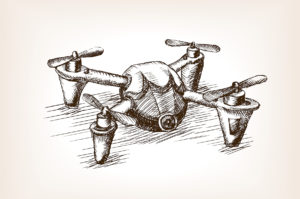The Australian drone laws and regulations date back to 2002 when they were first introduced, and since then they’ve been updated to reflect the innovation we’ve seen in the drone sector. In Part One we take you through important license and accreditation practices.
Registration
(Updated 01/10/2020) As of the 30th September 2020, drone registration is officially open for commercial drones. Registration will be mandatory for commercial drones from the 28th of January 2021, however, will be free for any drone registered before June 30th 2021. Registration will be valid for 12 months.
Operator Licenses or Accreditation
The qualifications required for a drone operator to legally fly depend on both the type of drone and the context of its flight.
Remotely Piloted Aircraft Operator’s Certificate (ReOC)
According to CASA, this certificate gives its holders permission to earn money for flying, employ remote pilot license (RePL) holders and fly outside standard operating conditions.
ReOCs are issues to government entities or people and businesses with either an ACN or ARBN. After successfully obtaining your ReOC it will be valid for 12 months. From here you can apply to have it renewed, and approved renewals are valid for up to 3 years.
When obtaining your certificate, you can elect for multiple remotely piloted aircraft (RPA) categories to be included (such as multi-rotor, aeroplane, helicopter, powered lift and airships). A weight category is also included with the certificate.
The ReOC also has the option to apply for additional permissions to fly under conditions such as closer than 30 meters to people or outside of visual line-of-sight.
Remotely Piloted Aircraft Operator’s Certificate (RePL)
This certificate allows the holder to fly RPAs for money or under circumstances that require specialist training.
RePL’s are required if an operator wants to fly: drones larger than 2kg for commercial operations (i.e. getting paid to fly), outside the drone safety rules or for a ReOC holder.
The good news is unlike ReOC’s, RePL’s do not expire and there is also no minimum age requirement to obtain one; however, to register a drone operators must be aged 16 years or older.
To apply for an RePL you must apply for an aviation reference number (ARN) and complete required training (which depends on the operators’ level of aviation experience).
Exceptions
Operators may not need to get formal certificates if they are operating under the ‘flying for fun’ or ‘Sub 2Kg’ categories.
Currently, flying for fun means no registration is required. Once future amendments to the Civil Aviation Safety Regulations Part 101come into effect however, this will change.
The Sub 2kg Drones Category also provides an exemption to operators in industries such as photography or filmmakers, real estate agents or construction workers. Rather than needing to obtain a RePL or ReOC operators can follow a different process. They must still apply for an Aviation Reference Number (ARN), notify CASA 5 days before they intend to fly and must stay within the drone safety rules of operation. Much like how the flying for fun conditions will change, later on, drone accreditation will be required for Sub 2kg operators and their drone will need to be registered. Accreditation for this category will consist of a free safety video and an online quiz. This accreditation will last for three years and will provide a certificate allowing the holder to fly and supervise others (however persons aged under 16 years will need to be supervised by an appropriately accredited adult at all times).
*Precision Autonomy also provides insurance cover for business operations in the Sub 2kg Drone Category.
If you’re unsure what kind of license your or your business may need, head over to the CASA website for more detailed information.
References:
https://www.casa.gov.au/drones/repl
https://www.casa.gov.au/drones/reoc/get-your-reoc
https://www.casa.gov.au/drones/rules/accreditation
https://www.casa.gov.au/knowyourdrone/registration-and-accreditation



